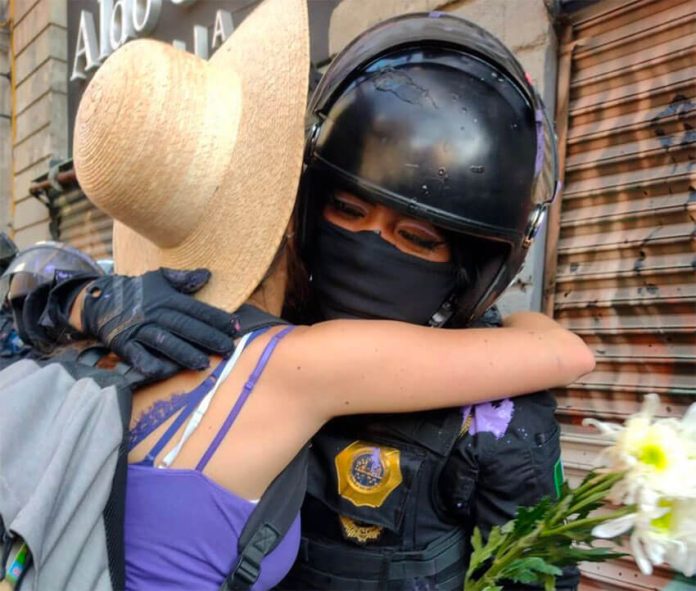An estimated 75,000 women marched in Mexico City on Tuesday to protest gender-based violence on International Women’s Day.
The march – which denounced crimes such as femicide and rape as well as high levels of impunity for such offenses – was largely peaceful, although some incidents of violence and vandalism were reported.
Women and girls gathered at the Angel of Independence monument on Reforma Avenue and the nearby Monument to the Revolution on Tuesday afternoon before making their way to the zócalo, Mexico City’s central square.
Chanting anti-violence and pro-justice slogans while carrying placards with messages such as “we want to live” and “together, free and without fear,” the protesters were accompanied by police women, some of whom were given flowers in appreciation of their work.
On Eje Central, the main thoroughfare that divides the capital’s historic center, a police commander called on her subordinates to join the march in solidarity with the protesting women, an instruction that was met with overwhelming approval.
Mexico City government secretary Martí Batres said the vast majority of women protested peacefully, but acknowledged that the march was infiltrated by violent groups.
“We carried out several operations that allowed … the effects of these violent groups to be inhibited,” he said.
Police seized almost 300 items with the capacity to inflict physical and material damage, including hammers, pipes, chisels, flares, sticks and paint.
But a contingent of women dressed in black known collectively as el bloque negro, or the black bloc, nevertheless went on a rampage ahead of the main group of protesters, vandalizing public property and attacking at least one police woman.
Two members of the bloc were injured when glass fell on top of them while vandalizing the Hidalgo Metro station, while a police woman was attacked with an ice ax, El Universal reported.
The aggressor was not detained due to orders from the Mexico City government not to arrest radicals, the newspaper said, adding that the attack would have been considered attempted murder in other circumstances. There were also clashes between police officers and aggressive protesters in the zócalo, which was filled by women in the late afternoon.
La policía consciente se une al contingente. Jefa Andrómeda: con o sin uniforme todas somos mujeres. pic.twitter.com/Ed6a3lUh0P
— Claudia Sheinbaum (@Claudiashein) March 9, 2022
Six police women and the two members of the black bloc cut by glass were taken to hospital for treatment, Reforma reported. Paramedics treated 40 people for injuries sustained during the march, Batres said.
Radical protesters also attempted to topple barricades erected to protect public buildings and monuments, and set fire to photographs of rapists and perpetrators of femicide. The Mexico City government denied that tear gas was used against hostile protesters in the zócalo, but there was evidence to the contrary, Reforma said.
On Twitter, Mexico City Mayor Claudia Sheinbaum chose to focus on the positive rather than the negative.
“Today, on International Women’s Day, thousands marched peacefully for equality and the eradication of violence against women. The police … did extraordinary preventative work,” she wrote in a post accompanied by a photo of a protester and a police officer embracing.
With reports from Reforma and El Universal
